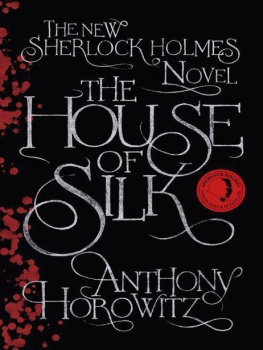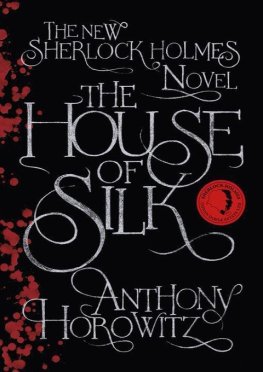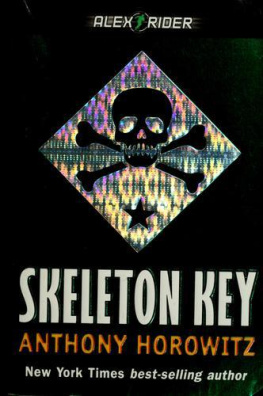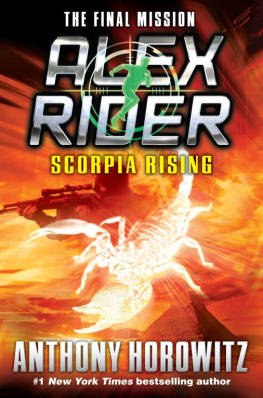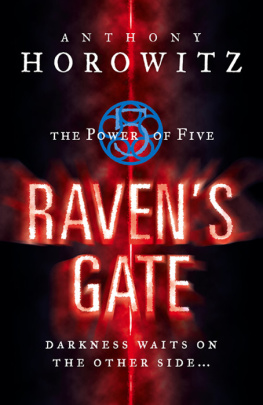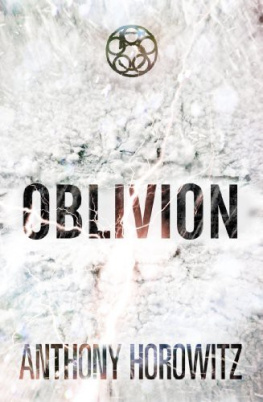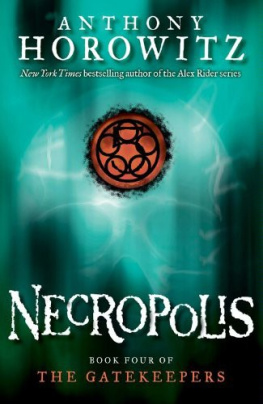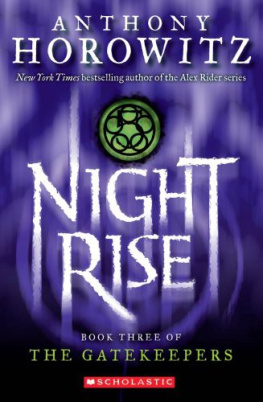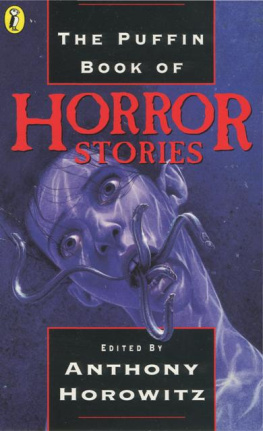Table of Contents
To R & NA. 009.
ALSO BY ANTHONY HOROWITZ
THE ALEX RIDER NOVELS:
Stormbreaker
Point Blank
Skeleton Key
Eagle Strike
Scorpia
Ark Angel
Snakehead
THE DIAMOND BROTHERS MYSTERIES:
The Falcons Malteser
Public Enemy Number Two
Three of Diamonds
South by Southeast
Horowitz Horror
More Horowitz Horror
The Devil and His Boy
crocodile tears: fake or hypocritical tears.
From the belief that crocodiles will pretend
to cry in order to attract their victims...
and will then cry for real as they devour them.
FIRE STAR
RAVI CHANDRA WAS GOING to be a rich man.
It made his head spin to think about it. In the next few hours, he would earn more than he had managed in the last five years: a fantastic sum, paid in cash, right into his hands. It was the start of a new life. He would be able to buy his wife the clothes that she wanted, a car, a proper diamond ring to replace the band of cheap gold she had worn since they were married. He would take the boys, aged four and six, to Disneyland in California. And he would travel to London and see the Indian cricket team play at Lords, something he had dreamed about all his life but had never thought possible.
Until now.
He sat hunched up beside the window of the bus that was taking him to work, as he had done every day for as long as he could remember. It was devilishly hot. The fans had broken down once again and of course the company was in no hurry to replace them. Worse still, this was the end of June, the time of the year known in southern India as Agni Nakshatramor Fire Star. The sun was unforgiving. It was almost impossible to breathe. The damp heat clung to you from morning until night and the whole city stank.
When he had money, he would move from this area. He would leave the cramped two-bedroom apartment in Mylapore, the busiest, most crowded part of the city, and go and live somewhere quieter and cooler with a little more space to stretch out. He would have a fridge full of beer and a big plasma TV. Really, it wasnt so much to ask.
The bus was slowing down. Ravi had done this journey so many times that he would have known where they were with his eyes closed. They had left the city behind them. In the distance there were hillssteep and covered, every inch of them, with thick, green vegetation. But the area he was in now was more like a wasteland, with just a few palm trees sprouting among the rubble and electricity pylons closing in on all sides. His place of work was just ahead. In a moment, they would stop at the first security gate.
Ravi was an engineer. His identity badge with his photograph and his full nameRavindra Manpreet Chandradescribed him as a Plant Operator. He worked at the Jowada nuclear power station just three miles north of Chennai, the fourth largest city in India, formerly known as Madras.
He glanced up and there was the power station in front of him, a series of huge multicolored blocks securely locked inside miles and miles of wire. It sometimes occurred to him that wire defined Jowada. There was razor wire and barbed wire, wire fences and telephone lines. And of course, the electricity that they manufactured was carried all over India by thousands more miles of wire. How strange to think that when someone turned on their TV in Pondicherry or their bedside light in Nellore, it had all begun here.
The bus stopped at the security point with its TV cameras and armed guards. Following the 9/11 attacks on New York and Washington, nuclear power plants all over the world had become recognized as potential terrorist targets. New barriers had been added. Security forces had been enlarged. For a long time it had all been an incredible nuisance, with people ready to jump on you if you so much as sneezed. But it had been many years since 9/11. People had become lazy. Take old Suresh, for example, the guard at this outer checkpoint. He recognized everyone on the bus. He saw them at the same time every day: in at half past seven, out at half past five. Occasionally, hed bump into them while strolling past the shops on Rannganatha Street. He even knew their wives and girlfriends. It wouldnt have occurred to him to ask for ID or to check what they were carrying into Jowada. He waved the bus through.
Two minutes later, Ravi got out. He was a short, skinny man with bad skin and a mustache that sat uncomfortably on his upper lip. He was already wearing overalls and protective steel-capped shoes. He was carrying a heavy toolbox. Nobody asked him why he had taken it home with him when normally he would have left it in his locker; nobody had cared. It was quite possible that hed had to fix something in the apartment where he lived. Maybe hed been moonlighting, carrying a few jobs out for the neighbors for a few extra rupees.
The bus had come to a final halt beside a brick wall with a door that, like every door at Jowada, was made of solid steel, designed to hold back smoke, fire, or even a direct missile strike. Another guard and more television cameras watched as the passengers got out and went through. On the other side of the door, a blank, whitewashed corridor led to a locker room, which was one of the few places in the complex that wasnt air-conditioned. Ravi opened his locker (there was a pinup of the Bollywood star Shilpa Shetty stuck in the door) and took out a safety helmet, goggles, earplugs, and a fluorescent jacket. He also removed a bunch of keys. Nuclear power stations do not use swipe cards or electronic locks on the majority of their doors. This is another safety measure. Manual locks and keys will still operate in the event of a power failure.
Still clutching his toolbox, Ravi set off down another corridor. When he had first come here, he had been amazed how clean everything wasespecially when he compared it to the street where he lived, which was full of rubbish and potholes filled with muddy water and droppings from the oxen that lumbered along, pulling wooden carts between the cars and the motorized rickshaws. He turned a corner and there was the next checkpoint, the final barrier he would have to pass through before he was actually in.
For the first time, he was nervous. He knew what he was carrying. He remembered what he was about to do. What would happen if he were stopped? He would go to prison, perhaps for the rest of his life. He had heard stories about Chennai Central Jail, about inmates buried in tiny cells far underground and food so disgusting that some preferred to starve to death. But it was too late to back out now. If he hesitated or did anything suspicious, that was one sure way to get stopped.
He came to a massive turnstile with bars as thick as baseball bats. It allowed only one person in at a time, and then you had to shuffle through as if you were being processed, as if you were some sort of factory machine. There was also an X-ray scanner, a metal detector, and yet more guards.
HeyRavi!
Ramesh, my friend. You see the cricket last night?
I saw it. What a game!
Soccer, cricket, tennis... whatever. Sports were their currency. Every day, the plant operators passed it between them, and Ravi had deliberately watched Wimbledon the night before so that he could join in the conversation. Even in the cool of the corridor, he was sweating. He could feel the perspiration beading on his forehead and he wiped it away with the back of his hand. Surely someone would stop him and ask him why he was still holding on to his toolbox. Everyone knew the correct procedure. It should be opened and searched, all the contents taken out.




